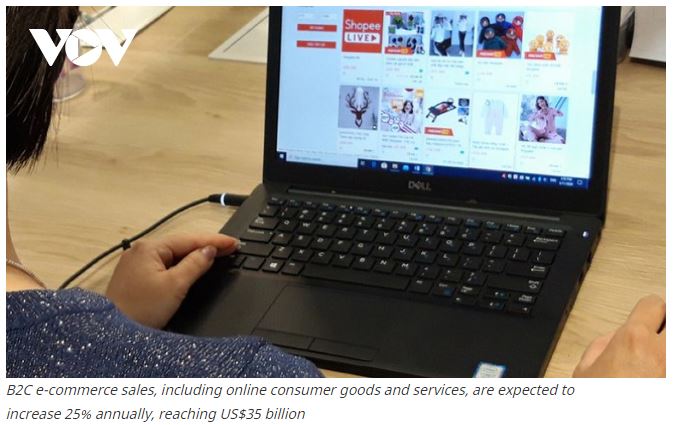Vietnam: Digital transformation accelerates online sales target of US$35 billion
Vietnam is set to see 55% of the local population regularly participate in online shopping activities by 2025, with the value of goods purchased through the internet and online services reaching an annual average of US$600 per person.
The Department of E-Commerce and Digital Economy under the Ministry of Industry and Trade believes that e-commerce represents one of the pioneering fields of the digital economy. Moving forward, Industry 4.0 technologies will be widely used in an effort of boost the efficiency of the business cycle as a means of modernising the distribution system, therefore improving the competitiveness of domestic enterprises whilst also promoting the development of the local and export market.
The e-Conomy SEA 2020 report, jointly compiled by Google, Temasek of Singapore, and venture capital firm Bain & Company, focused on the largest six economies of Southeast Asia, including Indonesia, Malaysia, Singapore, Thailand, the Philippines, and Vietnam.
Domestically following various lockdown periods, users turned to the internet for solutions to their sudden challenges. This saw a significant number of people make use of digital services with 41% of all digital service consumers being new, higher than the SEA average, and 94% of these new consumers intending to continue their online shopping habits in the post-pandemic period.
E-commerce has driven significant growth locally, at 46%, alongside strong growth across the majority of sectors with the exception of travel. Overall, the year’s gross merchandise value (GMV) is anticipated to reach a total value of US$14 billion, representing annual growth of 16%. Looking forward to 2025, the overall economy is likely reach US$52 billion in value, especially with both Hanoi and Ho Chi Minh City being named among the top 10 most dynamic cities in the world in 2019, according to City Momentum Index 2019.
Nguyen The Quang, deputy head of the Department of E-Commerce and Digital Economy, cites the Vietnam E-Commerce Whitepaper 2020 which outlines how the size of the country’s business-to-business (B2B) e-commerce market enjoys an average annual growth of 20% to 30%. Elsewhere, business-to-consumer (B2C) e-commerce revenue in 2019 hit US$10.08 billion, whilst the estimated value of online shopping stood at US$225 per person per year, the highest regionally.
Currently, increasing numbers of domestic businesses choose to apply e-commerce in support of import and export activities. On a global scale, cross-border e-commerce has witnessed rapid growth and has become a prominent trend of the sector in recent years, thereby offering plenty of opportunities for startups to make swift progress.
“In fact, there are many successful businesses and they consider e-commerce platforms as support tools and their main business form. Nowadays, with the remarkable advancement of technology, every business, especially small and medium enterprises, is able to directly access domestic and foreign consumers.
Moreover, thanks to BigData and IoT technologies, businesses can analyse consumer behaviour in all markets, through which they can self-improve products according to consumer needs, work out a customer care strategy, and a marketing strategy for the right target consumers at a low cost,” Quang said.
According to Vu Duc Thinh, general director of Lazada Logistics Vietnam, opportunities remain equal, although success can be viewed as being different. Although many businesses enjoy the huge potential of e-commerce development, domestic firms face numerous difficulties in terms of the process of transformation, with up to 72% of local small and medium enterprises (SMEs) facing at least four major challenges despite having a digital transformation orientation.
These issues include having few opportunities to access relevant digital technologies, not being fully equipped with a business mindset on relevant platforms, a lack of understanding of customers’ data whilst operating on these platforms, in addition to logistics-related issues.
According to experts, the digital economy is becoming an increasingly important aspect of the national economy due to it being applied in industry, agriculture, finance, banking, and services. Being based on digital technology and the internet, it serves to create plenty of job opportunities, increase income, utility, and improve the quality of people’s day-to-day lives.
Economic expert Dr. Nguyen Minh Phong acknowledges that, amid the novel coronavirus (COVID-19) pandemic, social distancing measures and border closures in some places have forced many enterprises to undergo transformations in an effort to adapt to the development of e-commerce. This is along with a number of new business models that are based on the digital-based economy, especially traditional non-contact service activities.
The Vietnamese Party and State have therefore issued guidelines and policies whilst making close efforts to invest in important infrastructure that can develop IT and communication, in addition to also promoting e-commerce and applying modern technology in relation to the scientific and technological revolution.
In line with this, B2C e-commerce sales, including online consumer goods and services, are expected to increase 25% annually, reaching a figure of US$35 billion and accounting for 10% of the total retail sales of goods and consumer services nationwide. VOV
Source: https://vietnamnet.vn/en/business/digital-transformation-accelerates-online-sales-target-of-us-35-billion-693872.html


 Thailand
Thailand




